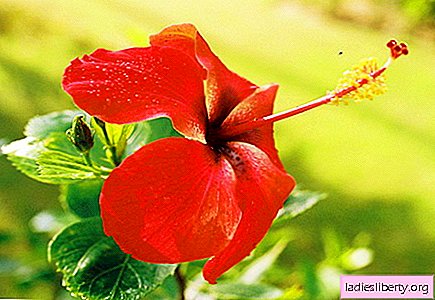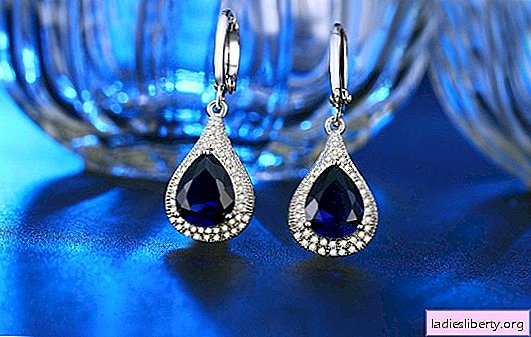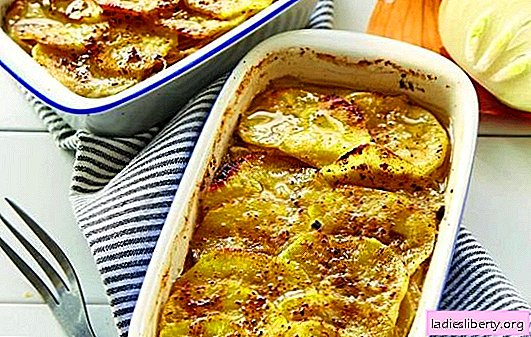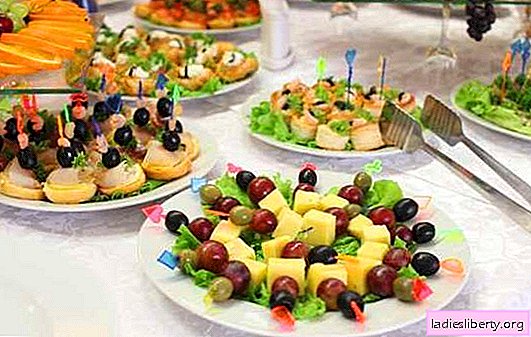
Karkade - general description
Karkade - This is the name of the dried flowers of the Sudanese rose, otherwise called hibiscus (lat. Hibiscus sabdariffa). This plant is a relative of the Chinese rose. Despite the fact that it grows only in a warm climate, a drink from it is popular in all latitudes.
The Sudanese rose itself is an annual plant of the Malvaceae family, it has an erect stem up to 1.5-2.0 meters in height, branching at the base. The leaves are alternate, have the shape of an ovoid, to the apex become three-lobed. The flowers are bright red large and fleshy, have a five-membered nimbus and a deeply dissected bowl. The fruit is in the form of a box.
Karkade - types and places of growth
As the name of the Sudanese rose shows, its homeland is the northeastern regions of Africa. The plant is successfully cultivated there for both food and technical purposes. It is also successfully grown in Southeast Asia. In Russia, hibiscus is not grown, but imported with success, so that it can be purchased almost everywhere both in pharmacies and in ordinary grocery stores.
Hibiscus - healing properties
Hibiscus contains a large number of acids, including tartaric, ascorbic, citric, malic, and others. In addition, Sudanese rose contains mucus and anthocyanins, which give the tea a unique bright ruby color and help maintain a healthy state of blood vessels. It also contains polysaccharides and flavonoids that cleanse the body of toxins and toxins.
The list of medicinal properties of hibiscus should begin with its ability to have a diuretic effect. It is also able to lower blood pressure in hypertension, protect the circulatory system from damage, prevent blood clots, and improve blood circulation. Its property is known to fight pathogenic intestinal microflora, without having a negative effect on beneficial bacteria.
Preparations based on Sudanese rose flowers are also used in the treatment of respiratory diseases and as an antitussive, since hibiscus tea is able to thin the sputum and contribute to its better discharge from the bronchi.
In addition, hibiscus is used for spasms of smooth muscles (uterus and gastrointestinal tract), as well as a mild laxative. In addition, hibiscus has a tonic ability, gives a general strengthening effect and very well helps with a hangover syndrome. Outwardly, preparations based on Sudanese rose flowers are used for eczema and abscesses.
Karkade - dosage forms
Hibiscus preparations for external and internal use are prepared from dried, crushed flowers of a plant. The flowers are collected together in sub-dishes at the end of flowering, dried in the sun or in special dryers, cut and laid in a dry airtight container.
Hibiscus - recipes
When using hibiscus as a tonic and restorative, it is brewed like tea. The strength of the drink is determined by individual preferences, but mainly take 1 tbsp. a spoonful of flowers per 1 liter of water. It should be noted that you need to brew the petals with very hot, but not boiling water, then insist for 10-15 minutes and drink hot or cold. Contrary to popular belief, the temperature of tea does not affect a decrease or increase in blood pressure.
Infusion Hibiscus for external use is prepared from 15 g of flowers, poured with 1 liter of boiling water. The liquid is insisted for 20 minutes, periodically vigorously shaking, then used for compresses.
Hibiscus - contraindications
Hibiscus tea is not recommended for people suffering from urolithiasis or cholelithiasis; it is also contraindicated in gastritis, gastric ulcer and high acidity. Hibiscus can cause allergic reactions, so use it for the first time with caution.
Comments











